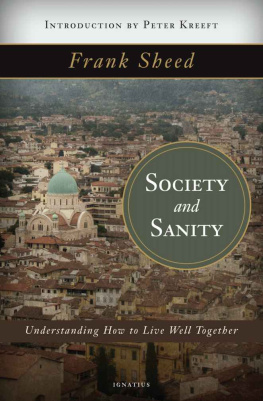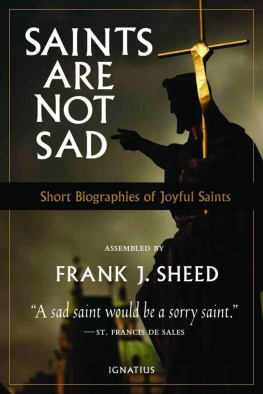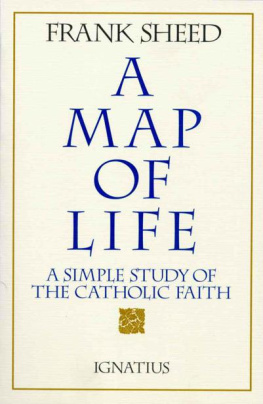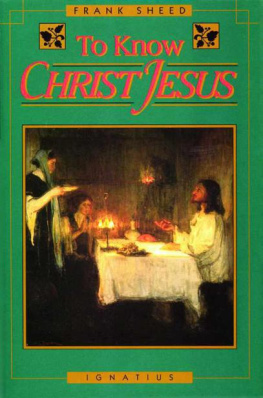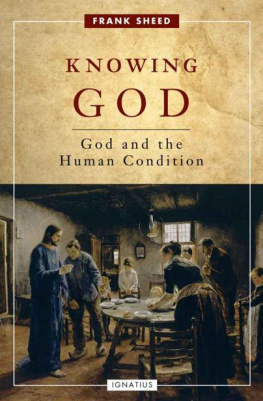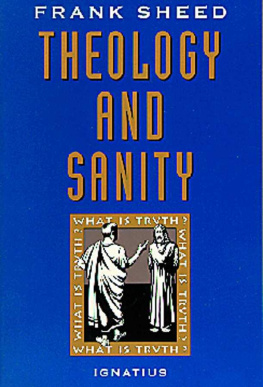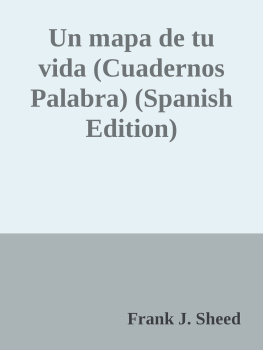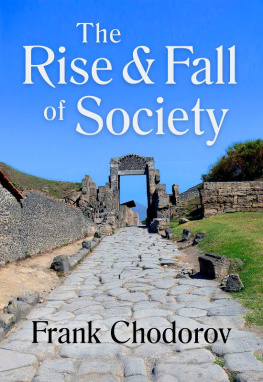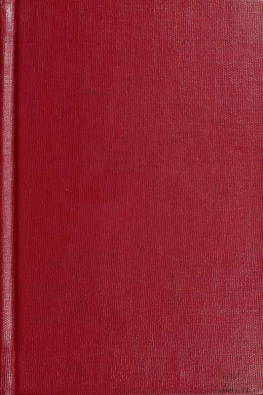Frank Sheed - Society and Sanity
Here you can read online Frank Sheed - Society and Sanity full text of the book (entire story) in english for free. Download pdf and epub, get meaning, cover and reviews about this ebook. year: 1975, publisher: Sheed & Ward Ltd, genre: Science. Description of the work, (preface) as well as reviews are available. Best literature library LitArk.com created for fans of good reading and offers a wide selection of genres:
Romance novel
Science fiction
Adventure
Detective
Science
History
Home and family
Prose
Art
Politics
Computer
Non-fiction
Religion
Business
Children
Humor
Choose a favorite category and find really read worthwhile books. Enjoy immersion in the world of imagination, feel the emotions of the characters or learn something new for yourself, make an fascinating discovery.
- Book:Society and Sanity
- Author:
- Publisher:Sheed & Ward Ltd
- Genre:
- Year:1975
- Rating:4 / 5
- Favourites:Add to favourites
- Your mark:
- 80
- 1
- 2
- 3
- 4
- 5
Society and Sanity: summary, description and annotation
We offer to read an annotation, description, summary or preface (depends on what the author of the book "Society and Sanity" wrote himself). If you haven't found the necessary information about the book — write in the comments, we will try to find it.
Society and Sanity — read online for free the complete book (whole text) full work
Below is the text of the book, divided by pages. System saving the place of the last page read, allows you to conveniently read the book "Society and Sanity" online for free, without having to search again every time where you left off. Put a bookmark, and you can go to the page where you finished reading at any time.
Font size:
Interval:
Bookmark:
SOCIETY AND SANITY
F.J. SHEED
SANITY
How to Live Well Together
IGNATIUS PRESS SAN FRANCISCO
1953 by Sheed & Ward, New York
Published by arrangement with
The Continuum International Publishing Group, New York
Cover photograph of Florence, Italy, by Alison Faulkner
Cover design by John Herreid
Foreword 2013 by Ignatius Press, San Francisco
Published 2013 by Ignatius Press, San Francisco
ISBN 978-1-58617-730-0
Library of Congress Control Number 2012942825
Printed in the United States of America
It is a great honor to be asked to write a foreword to a masterpiece.
The book you hold in your hands is, I firmly believe, the single most useful and important book (outside of the Churchs own official teachings in the Catechism of the Catholic Church and the papal encyclicals) that we can possibly read about the single most important field of conflict between the Catholic Church and the increasingly de-Christianized Western world today.
Frank Sheed was one of the three best Catholic apologists of the twentieth century, the others being G. K. Chesterton and C. S. Lewis (a Catholic who thought he was an Anglican). Just as Sheeds Theology and Sanity remains the very best introduction to Catholic theology, Society and Sanity remains the very best introduction to Catholic social and political philosophy, even now, sixty years later. Like Huxleys preternaturally prophetic Brave New World , it is astonishingly current, though it was published in 1953.
The Church and the world both face exactly the same most basic problems and issues today as then. These issues are not only the perennial, unchanging ones that are many millennia old (good and evil, God and man, sin and salvation, life and death), but are even the new, distinctively modern ones that are only a century or two old, the new crises. What are these current civilizational crises?
For many centuries the issues that divided the Church and the world were theological issues. But today they are all social issues. All the hot-button controversies today are about man and marriage and sex and society. This is why the greatest philosopher of modern times, John Paul the Great, focused on anthropology; what C. S. Lewis called the abolition of man follows necessarily upon the abolition of God from any area of lifenot only theology but also society, both private (sex, marriage, and family) and the public square. The greatest war today is not in the Middle East but in the Middle Earth of Europe and North America. It is a war between two world and life views, especially views of man and society. The new view was summarized most candidly by Justice Anthony Kennedy of the U.S. Supreme Court in his support of abortion in the Planned Parenthood v. Casey decision: At the heart of liberty is the right to define ones own concept of existence, of meaning, of the universe, and of the mystery of human life. In other words, Move over, God; youre sitting in my seat.
These conflicts center around three areas: the Christian and Catholic view of man, of marriage, and of society. (There is, by the way, almost nothing in this book that biblical Protestants should not find equally compelling.) It is really three little books, making it the best available introduction to Christian anthropology, Christian sexology and marriageology, and Christian sociology. The foundational principles it lays out in these three areas are the most basic and essential, both logically and practically, the most currently ignored and neglected, and the most urgently necessary-to-restore principles of man, of marriage, and of social moralitythe foundations it is literally insanity to neglect.
To explain the three parts of morality, C. S. Lewis in Mere Christianity used the unforgettable metaphor of humanity as a fleet of ships. Their sailing orders tell them the three practical things they most need to know: (1) how to cooperate, how to work together as a fleet; (2) how each individual ship is to stay shipshape and afloat; and (3) what the mission of the whole fleet is. The first is social morality, the second individual morality, and the third is philosophy, especially philosophy of man or philosophical anthropology, and of the meaning of human life. It is the third that is studiously ignored today; yet the other two absolutely depend on it. How can we become good individual human beings and how can we build a good human society if we do not know, or even ask, what humanity is and what humanity is for? That is the very first foundational question. Nowhere will you find a book about that question that is more clear and commonsensical, more sane and sagacious, more fundamental and foundational, than this one.
Today it is not the new, advanced stories of the social building but the very simplest and most fundamental foundations that are crumbling; and it is to those foundations that we must first turn if we are to repair the upper stories. Imagine a China that can no longer understand the common sense wisdom of Confucius, the philosopher who sounds most like Mister Rogers from Mister Rogers Neighborhood . That is todays China. Imagine a Western educational world that has forgotten the lessons it learned in kindergarten. (See Robert Fulghrums wonderfully wise Everything I Needed to Know, I Learned in Kindergarten. ) Imagine bright college students of philosophy who comprehend Hegel and Heidegger, Marx and Nietzsche, even Derrida and Deconstructionism, but find Aristotle, the most commonsensical philosopher who ever lived, to be the very hardest one in history to comprehend and pass exams on. You have just imagined my students. Worse, you have just imagined the world you are living in. The building we live in is big and beautiful but it is collapsing because its foundations are crumbling.
This is a book about those foundations. It is so simple that it is stunning, because it is radical, i.e., about the roots. For instance, its very first and most important point, implied in the title, is that (in Sheeds own words)
our treatment of anything must depend, in the last resort, on what we think it is: for instance, we treat people one way and cats another, because of our idea of what a man is and what a cat is. All our institutions... grew out of what those who made them thought a man was.... In every field, the test of sanity is what is ; in the field of human relations, the special test is what man is.... The total ignoring of this question runs all through modern life.... Yet it does not strike people as odd. And the depth of their unawareness of its oddness is the measure of the decay of thinking about fundamentals.The book will be hated and feared, and therefore ignored, by the barbarians who have commandeered the formal and informal educational institutions of our civilization. Why? For the same reason Great Books are hated and feared above all things in progressive educational circles. It is the same reason cavities hate dentists. It will be feared because it dares to assume that there is such a thing as truth, and that we can and must know the most important truths about ourselves and our true happiness. It dares to ask the great old questions, the currently forbidden questions, like Socrates, or like the little boy in The Emperors New Clothes . It will therefore be labeled dogmatic by those who dogmatically forbid those questions and who call themselves open-minded and progressive.
If you care about the Brave New World our society is moving toward, and if you want to know the minimum that you must know in order to reverse that direction, this is the book you must start with.
Peter Kreeft
O UR TREATMENT of anything must depend, in the last resort, on what we think it is: for instance, we treat people one way and cats another, because of our idea of what a man is and what a cat is. All our institutionsfamily, school, trade union, government, laws, customs, anything you pleasegrew out of what those who made them thought a man was. If you want to understand them profoundly, you must get at the idea of man that they express. There are periods of human history when it is not immediately and obviously necessary to make this sort of profound enquiry. When institutions are long-established, functioning healthily, serving happiness, the mass of men may very well decide simply to live by them and ask no questions. But when anything goes wrong with an institutionso that we have to decide whether to mend it (and if so, how) or to scrap it (and if so, what to put in its place)then the question what man is immediately becomes not only practical, but of the first practicality.
Next pageFont size:
Interval:
Bookmark:
Similar books «Society and Sanity»
Look at similar books to Society and Sanity. We have selected literature similar in name and meaning in the hope of providing readers with more options to find new, interesting, not yet read works.
Discussion, reviews of the book Society and Sanity and just readers' own opinions. Leave your comments, write what you think about the work, its meaning or the main characters. Specify what exactly you liked and what you didn't like, and why you think so.

